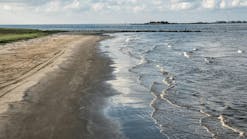The International Water Association (IWA) Hei-jin Woo Award is dedicated to the memory of Hei-jin Woo, a leading Korean female engineer and scientist who worked in the water field. The award recognizes the achievements of women in the water profession and was presented for the first time during the opening ceremony of the World Water Congress in Vienna on Sept. 7.
IWA President Dr. David Garman said, “The Hei-jin Woo Award recognizes women’s contribution to the advancement of the management of water. Joan Rose is a very worthy first recipient having established herself as a global leader in the health assessment of water supplies using both traditional techniques and advanced molecular science. Women are often underrepresented in our profession, and this award brings to the forefront female colleagues who lead their fields.”
Dr. Joan B. Rose works in water pollution microbiology, or public health microbiology. She has described her own journey of scientific inquiry as an attempt to understand the relationship between microbial water quality and human health. While practitioners in water sciences and engineering have focused on “indicators,” Rose has advanced the field by examining key parasites and viruses as waterborne pathogens and has supported the advancement of a waterborne pathogen genomics program. Her work has involved development of methods, surveys, investigations of waterborne outbreaks of disease, which includes the fate of these microbials in the environment, an understanding of the risk they pose and approaches for water quality and public health protection. Her work has had local, national and international impacts.
Over the course of more than three decades, Rose has developed molecular methods for the detection of emerging waterborne pathogens including the important parasite Cryptosporidium and more recently, for microbial source tracking. She has surveyed waters globally and studied beaches, sewage-impacted waters, water reclamation systems and drinking water, studying the effect of climate change on water quality. Finally, she has focused on quantitative microbial risk assessment, methods, tools and frameworks, bringing environmental monitoring into a risk- and evidence-based decision making process to protect public health.
Rose is currently co-director of the Center for Advancing the Microbial Risk Assessment and Center for Water Sciences at Michigan State University and focuses much of her work on the transboundary waters of the Great Lakes. She has published more than 250 manuscripts.
Source: International Water Association






